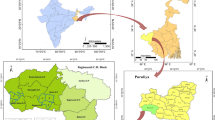Abstract
Water is an integral part of the human as well as animal life on the Earth. Safe clean and adequate drinking water is a basic need of all living beings, especially human beings, for cooking and other domestic basic needs. The present status of Indian water resource shows that only 47% of the total population is getting a safe drinking water facility. Water scarcity has become a huge problem with each and every villager in India. The present study focuses on water issues and the innovative water management system in rural villages of India. The learnings of this researcher can be replicated as well as adapted to other parts of the country for water conservation and management. The researcher was a Young Professional at SCOPE foundation Dharwad, Karnataka, India. The research work was done at Harobelwadi Village of Dharwad. The first-hand experiences of the researcher are reflected in the present paper. This paper addresses the efforts in creating awareness to villagers regarding water management, identifying water scarcity in the village and finding an alternative source. The researcher essential strategies used for long-term sustainability through community participation in the village for the water management, therefore Gram Panchayat has access to the use of safe and sustainable drinking water facilities in the rural village.
Similar content being viewed by others
References
Alcamo J, Barlund I (2016) A snapshot of the world’s water quality: towards a global assessment. United Nations Environment Programme, Norway
Bansil PC (2004) Water management in India. Concept Publishing Company, New Delhi
Burek P, Satoh Y, Fischer G, Kahil MT, Scherzer A, Tramberend S (2016) Water futures and solution: Laxenburg. International Institute for Applied Systems Analysis, Austria
Committee on Economic, Social and Cultural Rights (2002) The right to water arts. 11 and 12 of the international covenant on economic, social and cultural rights. The twenty-ninth session, E/C.12/2002/11. Economic and Social Council, United Nations.
Food and Agriculture Organization (2018) The state of food and agriculture. Migration, Agriculture, and Rural Development. FAO, Rome. www.fao.org/state-of-food-agriculture/en/
Gautam HR (2019) Ensuring safe and adequate drinking water, Kurukshetra. Ministry Rural Dev 67(08):5–8
Govt. of India (1999) Integrated water resources development: a plan for action. Report of the National Commission on Integrated Water Resources Development (NCIWRD), vol 1. Ministry of water resources
Govt. of India (2009) Background note for consultation meeting with Policy makers on review of National Water Policy. Ministry of Water Resources, p 50
International Energy Agency (2016) Water-energy nexus: excerpt from the world energy outlook 2016. IEA Publication, Paris
Khurana I, Romit S (2010) Drinking water quality in rural India: issues and approaches. Water Aid
Mekonnen MM, Hoekstra AY (2016) Four billion people facing severe water scarcity. Sci Adv 2(2)
Mwaseba D (1991) A study of popular participation in rural development projects at Morogoro District in Tanzania. Dissertation for Award of BSc Degree at University of Ife, Ile—Ife, Nigeria, p 143
National Institute of Hydrology (NIH) (2010) Water resources of India. NIH, Roorkee
OECD/FAO (2014) OECD-FAO agricultural outlook. OECD Publishing. http://www.agri-outlook.org/
Sakthivadivel R (2004) Rejuvenating irrigation tanks through the local institution. Econ Pol Wkly 39:3521–3526
Shah T (2011) Water and Welfare: critical issues in India’s water future. Econ Pol Wkly 39:1211–1213
Sugam RK (2019) Water security and sustained drinking water supply, Kurukshetra. Ministry Rural Dev 67(08):16–19
United Nations (2018) Sustainable development goal 6: synthesis report on water and sanitation. United Nations, New York
World Health Organization (2017) Guidelines for drinking-water quality, fourth edition, incorporating the first addendum. WHO, Geneva
World Health Organization/United Nations Children’s Fund (2017) Progress on drinking water, sanitation and hygiene: update and SDG baselines. WHO/UNICEF, Geneva
United Nations Children’s Fund (UNICEF), Food and Agriculture Organization of the United Nations (FAO) & The South Asia Consortium for Interdisciplinary Water Resources Studies (SaciWATERs) (2013). Water in India: situation and prospects
UNICEF, FAO & SaciWATERs, Delhi. http://www.unicef.org/india/media_8098.htm. Accessed Apr 2013
United Nations World Water Assessment Programme (2016) The United Nations world water development report 2016: water and jobs. UNESCO, Paris
United Nations World Water Assessment Programme (2017) The United Nations world water development report: wastewater—the untapped resource. UNESCO, Paris
World Resources Institute (WRI) (2007) Estimates of water resources and freshwater ecosystems—actual renewable water resources for 2007. WRI, Washington, DC
Author information
Authors and Affiliations
Corresponding author
Additional information
Publisher's Note
Springer Nature remains neutral with regard to jurisdictional claims in published maps and institutional affiliations.
Rights and permissions
About this article
Cite this article
Naika, R. Water management in rural communities: a step towards achieving sustainability By 2030. Sustain. Water Resour. Manag. 8, 115 (2022). https://doi.org/10.1007/s40899-022-00702-4
Received:
Accepted:
Published:
DOI: https://doi.org/10.1007/s40899-022-00702-4




